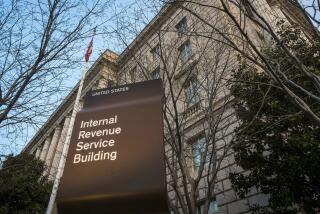22% of IRS Phone Advice Is Wrong, Study Finds
- Share via
WASHINGTON — The Internal Revenue Service provides wrong answers to nearly one-fourth of the taxpayers who call the agency’s toll-free telephone lines with questions about their income tax returns, congressional investigators said Wednesday.
The General Accounting Office, in a report to a House subcommittee, said IRS employees gave wrong answers 22% of the time when investigators posing as taxpayers called IRS assistance centers and asked 21 typical tax law questions. An additional 15% of the answers were correct but incomplete, the report said.
IRS Chief Concerned
IRS Commissioner Lawrence B. Gibbs, whose agency cooperated with the GAO survey, expressed concern about the findings and said he was “neither pleased nor satisfied about our performance in taxpayer assistance.”
He blamed the inaccurate answers on a lack of training of the seasonal workers the IRS hires to operate its toll-free lines and on problems created by continually changing tax laws.
The GAO, the investigative arm of Congress, said it placed 918 calls to IRS assistance centers between Feb. 17 and March 20, getting through to an agency employee 61% of the time on the first call and 87% of the time within five calls.
Accuracy Declines
Investigators told the House subcommittee on commerce, consumer and monetary affairs that the accuracy of the IRS answers and the timeliness of its responses were worse this year than in any of the five previous years that the GAO has audited the assistance program, except 1985.
Taxpayers are responsible for filing correct returns even if they are given incorrect answers by the IRS. But Gibbs said he “would not anticipate” that the agency would impose penalties on taxpayers if it is determined that errors on their returns resulted from erroneous information from the agency.
Rep. Doug Barnard Jr. (D-Ga.), the subcommittee chairman, said the taxpayer assistance program should operate with “a high degree of perfection” because wrong answers can affect tax liability and the credibility of the agency.
“When large numbers of taxpayers misunderstand their tax law responsibilities, voluntary compliance breaks down and scarce enforcement dollars, which should be used to identify tax evaders, have to be spent correcting the mistakes of confused taxpayers,” he said.
This year, the IRS has about 3,500 toll-free telephone lines at 32 sites and expects to answer more than 34 million questions, the GAO report said.
More to Read
Inside the business of entertainment
The Wide Shot brings you news, analysis and insights on everything from streaming wars to production — and what it all means for the future.
You may occasionally receive promotional content from the Los Angeles Times.










